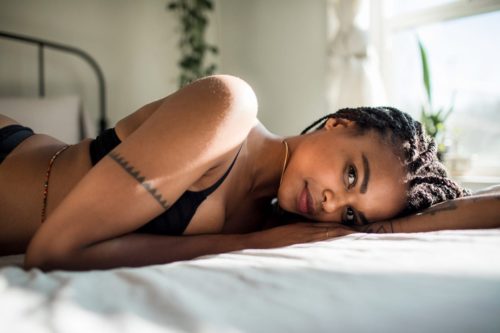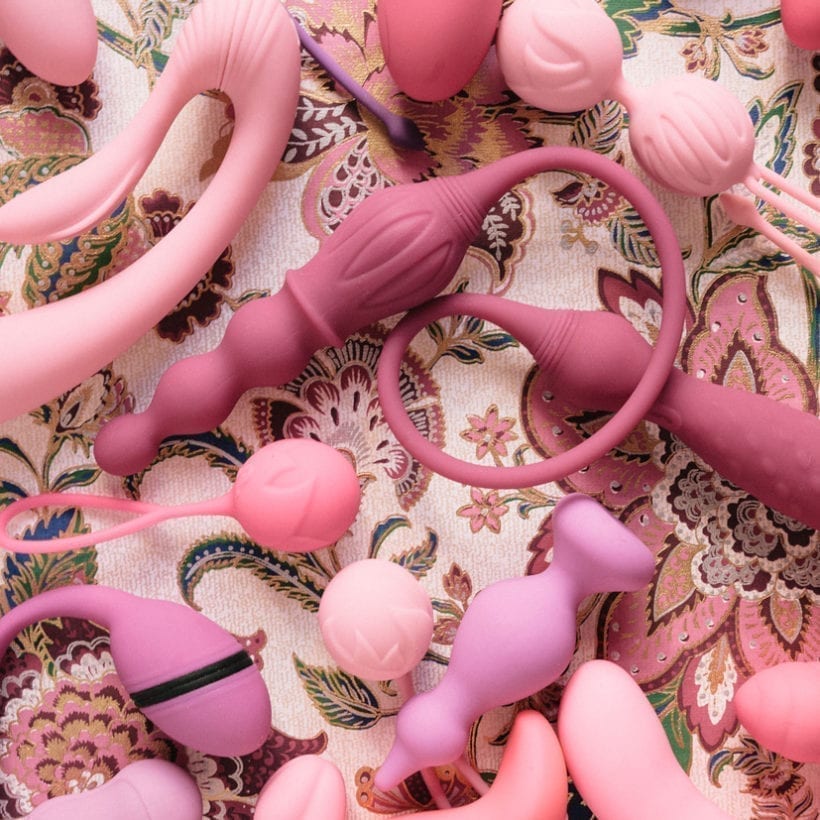The journey one takes to discover sexual liberation is different for each individual. And while there are many career paths under the sex education umbrella (educators, counselors, therapists, sexologists), I had the pleasure and privilege of speaking with Ev’Yan Whitney, a sexuality doula, about her career as a sex educator for eight years and what her teachings look like now.
While our careers share many similarities (healing and liberating clients), it was enlightening to learn about the practices of a sexuality doula — and what exactly a sexuality doula does. “I define it [as] someone who works with people through these transitions of sexual shame/sexual dysfunction/fear/confusion around their sexuality and sex life. I help transition them into feeling sexually free and sexually liberated and more aligned with their sexual lives and sexual identities,” says Whitney.
My career as a sex educator is rooted in journalism and psychology, but a doula is a non-medical companion that provides physical and emotional support, often in the form of information. And even though there are specific doulas assigned to aid various occasions in life (birth, abortion, adoption, death, etc.), Whitney takes the term to a new meaning. “I really get people thinking about what sexual liberation looks like for them and how they can embody sexual freedom and total sexual expression without any sort of shame or guilt,” she says.
As sex care becomes self-care, and more sites targeted for women pop up (Caroline Spiegel — Snap Inc. CEO Evan Spiegel’s sister— just launched Quinn, a non-visual porn site geared toward women), knowing who you are and what you want is more important than ever.
https://www.instagram.com/p/Bic63OQjzmg/
Shelby Sells: Why were you drawn to this profession?
Ev’Yan Whitney: I originally came into this work calling myself a sex coach (sexuality coach), and that was with a lot of heavy heart because I really didn’t resonate with the term ‘coach’ at all — it really wasn’t something I liked. Anytime I thought of the word ‘coach,’ I imagined this cishet white dude in football, so I didn’t resonate with it at all. I’ve had a lot of friends in my life who’ve been doulas (full-spectrum doulas, postpartum doulas, death/abortion doulas), and I was talking to one of these friends lamenting how … I didn’t want to call myself a sex coach anymore. She thought it would be amazing if I called myself a sexuality doula — [and] I’ve been working within that and defining it since then. As a sexuality doula … [I’m] holding space for people by asking them the really important questions they need to be asked to help them figure out who they are as sexual beings. I do that through education, teaching workshops and facilitating conversations on my podcast.
S: That’s so beautiful and necessary for a lot of people to feel complete or whole in themselves. Why is it important to destigmatize sexuality and remove the shame that’s been built around it through the patriarchy and other societal constructs?
E: One of the reasons why I started doing this work came from a place of trying to figure my own self out about my sexuality because I didn’t know who I was — and I was dogged down by shame and stigma and dogma attached to my sexuality. I’ve noticed that as I’ve done this work to unpack that and dismantle the patriarchy around my sexuality, I feel [freer]. I feel like I’m allowed to take up space within not just my sexuality but who I am as a Black queer person. To me, the sexual piece is such a foundational part of who we are and how we move through the world.
S: I think it’s really empowering. How do you think a person’s sexual wellness affects their day-to-day life?
E: If you’re able to speak up for what you want within a sexual context, it’s also going to be easier for you to speak up for what you want outside of a sexual context. When [clients] make more space for their sexuality within their day to day, they just feel more whole. They feel like they’re not fragmented or compartmentalizing parts of themselves and they’re able to hold space for every single aspect of who they are. In my experience, the sex piece is one of the last pieces we start to address. We do things with diet and health and in therapy, we’re doing a lot of self-care. When all of its said and done, we’re not really taking time to think about sexual wellness. My aim with my work is to try and get that on people’s radar in a gentle way that isn’t going to make them feel intimidated or scared or put even more shame upon it.
https://www.instagram.com/p/BpFQI9YA3WF/
S: Creating that autonomy over your body, especially as women, and especially as a black queer woman, you have to go out and claim that for yourself. It’s not easy. By claiming that autonomy over your body and mind, you are creating confidence and space for yourself to exist under your own rule.
E: Before we can talk to a partner about what we want, we have to figure out what it is we want. A lot of times, we go through the motions thinking because we’ve been with our partner for X amount of time that they should automatically know what we like and what our bodies need when the truth is no, we shouldn’t give people that kind of agency over our bodies. We should be able to say what our body wants and needs to feel safe. I like to start asking people to do that work for themselves by asking themselves, ‘What sort of sex do I want to be having with my partner? What does safe sex with my partner look like? How can my partner create spaces for me within our sexual relationship where I do feel safe to speak up? What do I need to ask for? How have I not been listening to my pleasure? How have I been decentering my pleasure?’ Really analyzing all of those things because once you get clear on that it’s going to be a lot easier for you to communicate that with your partner and let your partner know what you want and how you want to create the sexual relationship. The beautiful part of doing that work is that you can also then give these questions to your partner and have your partner also ask themselves what they want sexually and who they are sexually and how you can help them create a safe space for them to explore themselves sexually. I think we need to have conversations about sex way, way more.
S: Communication, especially when discussing sex, has become vital for me. Wants and needs change over time, and that doesn’t have to be a negative aspect regarding the relationship. So, it’s nice to do a little check-in every once in a while and see where everyone’s at.
E: My partner and I have been together for over 12 years now, and I think originally we came into the relationship thinking sex and consent is a thing you talk about once and that’s the way it is forever and that you never have to address it again. That did not work for us. We discovered that’s not how it is, especially because we got together so young and who we were sexually when we were 19, 20, 21 is not the same as who we are today. It makes a lot of sense to create space to continue this conversation because we’re always evolving and changing.
S: I want to talk about your workshops and one-on-one practices. Can you tell me more about that?
E: One workshop I’ve been teaching a lot is my Sensual Selfie workshop, which is a workshop where I help people liberate and celebrate their sexuality by taking sensual selfies. It includes a short presentation of me where I talk about my journey of self-portraiture as a way to acknowledge and celebrate and also heal my sexuality. I later give everyone who’s their permission to [take] a sensual selfie (or multiple selfies) in what I call a ‘selfie booth,’ which is something I create with a mirror. It’s got an altar and candles and music is playing while they’re able to be in this private, enclosed space and take the things we talk about in the workshop and apply them in real-time by taking those selfies. After the selfies have been taken, we all take turns (in this safe space made up of predominantly women and femme-identifying individuals) sharing our selfies with each other. I think that that, in it of itself, is radical because so many of the people who come to the workshop have only had experience with sensual selfies when they are looked upon and shared for the male gaze. Being able to have your sexuality and your softness and your sensuality affirmed and celebrated by the female/femme gaze is revolutionary. It’s one of my favorite things to teach.
https://www.instagram.com/p/BKv1Et1BlcI/
S: For people who are just beginning their journey towards sexual liberation, do you have any advice or offerings to share?
E: I definitely think that starting to take sensual selfies just for you as a way to see yourself as a sexual/sensual being. That has been a huge, huge addition to the way I affirm and see myself sexually. I think that is one really good place to start. So much of our sexual disconnection stems from the disconnection we have with our bodies. One of my favorite quotes by Marian Wright Edelman is ‘You can’t be what you can’t see.’ I can’t be sexually liberated unless I see myself as sexually liberated. Beyond [sensual selfies], two of my favorite books that I recommend to my clients all the time are Come As You Are by Emily Nagoski and Women’s Anatomy of Arousal by Sheri Winston. They bring a lightness and playfulness and really good information about sex from a place we haven’t ever heard before.
S: What’s one of your favorite ways to practice self-love?
E: Masturbation is a really good one. Not even just the act of masturbation, but me choosing very mindfully at that moment that I’m going to masturbate. It’s also to reconnect with my body, give myself some love and recenter my pleasure.
S: What would you say is the most rewarding part of your job?
E: Watching these women and femmes that I work with completely shed all of the old stories, narratives, and shame that has kept them from being sexually expressive and watch them step into their power as sexual beings. It’s a bittersweet moment when I release a client and they’re ready to flourish. It’s also a beautiful moment to go back and look at how far they’ve come and see how many things they’ve released and the obstacles they’ve overcome to get to this point. It’s inspiring to see them shine their light because it reminds me that I get to shine my light as well.
You can check out more of Ev’Yan’s work by listening to her podcast The Sexually Liberated Woman, following her on Instagram, and checking out her website for workshops and one-on-one healing.
We only recommend products we have independently researched, tested, and loved. If you purchase a product found through our links, Sunday Edit may earn an affiliate commission.







